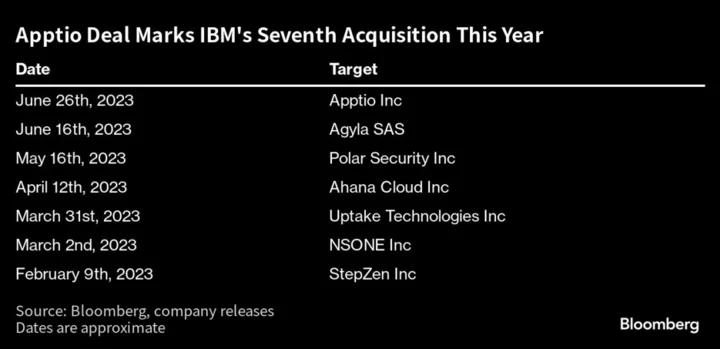
Fed Up With High Mobile Phone Bills? Take a Hard Look at What You're Paying for
Are you concerned about the monthly cost of your mobile plan? You're not alone: A
2023-06-19 20:51

Meta rolls out web version of Threads
Meta Platforms on Tuesday launched the web version of its new text-first social media platform Threads, in a
2023-08-22 21:17

Threads, Meta's Twitter clone, is arriving very soon
Meta's been hard at work on their version of Twitter. And surprise! That app, named
2023-07-04 16:23

Lightning eMotors Vehicles Surpass 5 Million All-Electric Miles
LOVELAND, Colo.--(BUSINESS WIRE)--Aug 22, 2023--
2023-08-22 20:26

China leads tech race, highlighting need for AUKUS sharing, says think-tank
By Kirsty Needham SYDNEY China leads research in 19 of 23 technologies set as priorities by the AUKUS
2023-06-05 22:24

UNC Chapel Hill shooting victim identified as associate professor Zijie Yan
Authorities have identified the faculty member killed in Monday’s shooting at the University of North Carolina at Chapel Hill. UNC PhD student Tailei Qi, 34, has been charged with first-degree murder in connection with the killing of Zijie Yan, an associate professor in the Department of Applied Physical Sciences and a researcher. Mr Yan was listed as his alleged killer’s academic advisor on Mr Qi’s UNC profile, which has since been removed from the university’s website. Yan joined UNC in 2019. Before that, he was an assistant professor at Clarkson University in New York and received postdoctoral training at the University of Chicago. Mr Qi and Yan co-authored several research papers focusing on nanoscience technology. But in tweets from an account believed to belong to Mr Qi, the alleged shooter complained about “bullies and his “PI” – referring to his unnamed head of lab – being unable to handle “these girls and tattletales”. “Just have a talk with my PI and get his promise. He should have more experience to handle with these girls and tattletales,” he wrote in August 2022. Two months later in October, he referred to his PI again: “Both the group of people to say I am lazy and that to prove me working hard instead of telling me that are trying to consume my privacy. I judge their motivation is only to tell my PI then control me by taletelling.” “But it’s weird when I talked about it with my PI, he said no people spoke to him about that. so it’s nothing but some voyeurism for these people?” Yan studied undergrad at the Hauzhong University of Science and Technology, where he obtained his bachelor’s in material science and engineering and computer science in 2005. The Rensselaer Polytechnic Institute, where Yan got his master’s in physics electronics, posted a tribute on Tuesday. “He is remembered fondly by many of us that met him in the classroom, lab, or in the hallway of MRC,” a Facebook post read. “Among other things, he distinguished himself with publishing 17 journal articles in the course of his PhD study...” UNC at Chapel Hill Chancellor Kevin M Guskiewicz said in a statement on Tuesday that he has met with Yan’s family. “My leadership team and I have met with his colleagues and family to express our condolences on behalf of our campus,” the statement read. “Please join me in thinking and praying for his family and loved ones during this difficult time.” UNC police said during a press conference on Monday that a motive was not immediately evident. Mr Qi, a second-year PhD student majoring in applied physical sciences, graduated from Wuhan University in 2015 and also received a master’s in material science from Lousiana State University in 2021. The suspect joined UNC at Chapel Hill’s Yan Lab in 2022. UNC graduate student Aiden Scott, a former classmate of Mr Qi, described him as “very quiet” but “nice.” “I would have never guessed that he would be the kind of person who could possibly be capable of this kind of thing,” Mr Scott told WRAL. “Every single time he would talk to me, he seemed very nice... when I saw his face in the reports online, I was beyond shocked,” UNC has cancelled all classes on Tuesday as an investigation remains ongoing. Mr Qi is expected to appear in court later today. Read More UNC shooting – latest: Graduate student charged with murder of faculty member on Chapel Hill campus He moaned about work, ‘bullies’ and his head of lab online. Then police say he shot dead a UNC faculty member UNC shooting suspect’s social media complaints about murdered faculty member revealed
2023-08-30 03:19

TXOne Networks’ New Edge V2 Engine for OT Cybersecurity Delivers Industry’s First Capability for Automatic Rule Generation, Enabling Effortless Network Segmentation
IRVING, Texas, & TAIPEI, Taiwan--(BUSINESS WIRE)--Sep 5, 2023--
2023-09-05 22:21

Apple lays down the gauntlet to the metaverse
Tech giant Apple has unveiled its first major product in more than seven years, a mixed-reality headset that might just deliver a...
2023-06-06 23:18

What happened between Floyd Mayweather and Adin Ross? Boxing legend declines 'broke' Kick streamer's request: 'Can't film me for free'
Following a 2v1 boxing match, Adin Ross conducted a live stream where he expressed his desire to meet the American boxing legend Floyd Mayweather Jr
2023-08-26 18:29

Google could use public data for AI training, according to new policy
Google can now use public data to help train and create AI products, according to
2023-07-05 03:49

The Apple Pencil (2nd Generation) is on sale for under £100 this Prime Day
TL;DR: The Apple Pencil (2nd Gen) is on sale for £99 this Prime Day. This
2023-07-11 13:26

MrBeast announces 'Extreme Olympics' video featuring a budget of over $4M, fans call YouTuber's content 'unmatched'
MrBeast asserts that his version of the Olympics will have sets two times bigger than the ones used for his 'Squid Game' video
2023-08-13 20:15
You Might Like...

IBM Will Buy Software Company Apptio for $4.6 Billion

Macron Says Mongolia to Supply Critical Metals for Green Push

Review of NCAA's business pushes association to get creative in supporting schools, athletes

COLOPL Group Company Brilliantcrypto Inc., Reveals “Brilliantcrypto,” The Blockchain Game Which Generates Economic Value in The Metaverse With Digital World Gemstones

Comcast Wants to Attract Customers With a New, $20 Cable Bundle

HP July 4th Sale: Up to 67% Off Laptops, Desktops, Monitors, Accessories

Nokia renews patent license agreement with Apple, covering 5G and other technologies

Kai Cenat becomes newest Complex cover star, psyched fans say 'this is fire'
